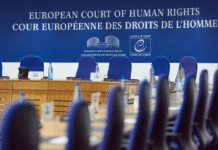Nils Muiznieks, Council of Europe Commissioner for Human Rights, has slammed Ankara Governor’s Office decision to ban any event organised by LGBTI organisations, such as the projection of films, staging of theatre plays, panels, discussions and exhibitions.
Relaesing a statement on the issue Muiznieks has stated that “I am concerned that this latest ban is the manifestation of a continuing backsliding in the field of human rights protection in Turkey and of growing intolerance towards LGBTI persons by the Turkish authorities.”
The statement came after the Governor’s Office ordered a ban on the public showing of all films, exhibitions and events related to LGBT issues, citing “public sensitivities.”
Muiznieks has summarised the statement as follow: “It is with consternation that I have taken note of a statement by the Ankara Governor’s Office regarding their decision to ban indefinitely any event organised by LGBTI organisations, such as the projection of films, staging of theatre plays, panels, discussions and exhibitions. The statement, dated November 19, justifies this measure on the grounds that such events ‘incite hatred’ between different segments of society and therefore would present a clear and present danger for public safety, and that ‘due to certain social sensitivities’ such activities may lead to reactions by some segments of society.
In addition, according to the statement this measure is also targeting the groups and persons potentially participating in such activities with a view to preventing crime, disruption of public order and the protection of ‘general health and morality, as well as the rights and freedoms of others.'”
“Such a blanket ban clearly disregards Turkey’s international human rights obligations, notably under the European Convention on Human Rights,” said Muiznieks and added that “The fact that an event may disturb or offend some people can under no circumstances serve as a justification to curtail the legitimate rights to freedom of expression, freedom of association and freedom of peaceful assembly of LGBTI persons, as well as the right of the entire population of Ankara to be informed about LGBTI issues.”
Muiznieks has also reminded that he has already stressed in my statements on the banning of the İstanbul Pride for three years in a row, in cases where the authorities have grounds to fear for the security of persons exercising their legitimate rights to freedom of expression and assembly, the authorities’ duty is to protect these persons from the extremists and potential criminals threatening them, not to restrict their rights.
“I am concerned that this latest ban is the manifestation of a continuing backsliding in the field of human rights protection in Turkey and of growing intolerance towards LGBTI persons by the Turkish authorities,” said Muiznieks and added that “It is also a cause for concern that the Governorship’s decision has been based once more on the overly prescriptive law on assemblies and marches, whose shortcomings I have been raising since 2013, as well as the extremely wide margin of appreciation afforded by the Turkish law on states of emergency.”
Muiznieks has also called on the Turkish central authorities to ensure that decentralised administrations uphold human rights standards and that this regrettable decision of the Ankara Governor’s Office is reversed immediately.
Meanwhile, LGBT rights organizations said on Sunday that they would launch a legal process against the Ankara Governor’s Office’s decision to ban all LGBT events in the Turkish capital. Two LGBT rights organizations, Pink Life and Kaos GL, issued a joint declaration after the ruling, saying the ban was “against the law, discriminatory and arbitrary.”
“With this decision, as well as the justifications for it that are contrary to the law, fundamental rights and freedoms such as the freedom of expression and organization were violated. With this decision, fundamental rights were violated through discriminatory motives,” said in the statement.
The authorities in Ankara had banned an LGBT film festival supporter by the German Embassy on Nov. 15, the day before it was due to start, citing “public safety and terrorism risks. German Deputy Foreign Minister Michael Roth criticized the ban, saying “the freedom of arts and minority rights are inviolable and this should also be applied in Turkey.”
Four movies by German directors were scheduled to be screened as part of the two-day festival, organized jointly by the German Embassy and the Pink Life QueerFest group. Pink Life QueerFest said the festival had been attacked on social media prior to the ban decision.
The bans come after annual LGBT pride marches have been banned for three years running in Turkey. The first LGBT Pride March permitted by the authorities was held in 2003 in İstanbul and was conducted for 13 years until 2015. However in June 2015 police dispersed the march using tear gas and rubber bullets. It was subsequently banned by the İstanbul Governor’s Office in 2016 and 2017, citing security reasons and “public sensitivities.”















